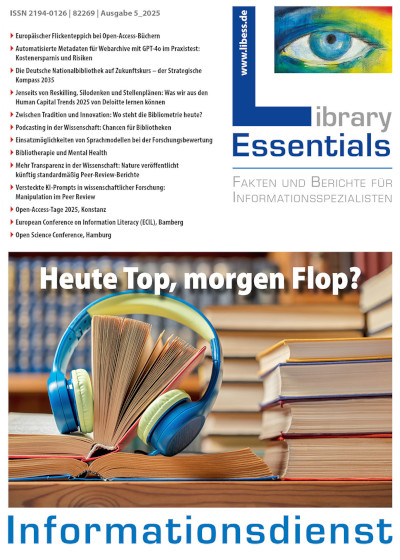 WEITERE NEWS
WEITERE NEWS
- Makulierung der Zettelkataloge der Staatsbibliothek zu Berlin bis Ende 2026
- KI für alle Hochschulen – GWDG legt Finanzierungskonzept für bundesweite Grundversorgung vor
- Strategie der Allianz für die Weiterentwicklung des wissenschaftlichen Publikationswesens 2026-2030
- Presse-Statement: "Abschaffung des Kulturpasses wäre ein großer Fehler"
- Deutscher Buchpreis 2025: Leseproben zu nominierten Titeln im Buchhandel erhältlich
- Europäischer Essaypreis für Bénédicte Savoy – Kulturelles Erbe Europas
- Ulrike von Hirschhausen wird Direktorin des Deutschen Historischen Instituts in Washington
- „AI for Society“ – PwC Deutschland und DFKI starten Initiative für praxistaugliche KI für Verwaltung und Gesellschaft

Aktuelles aus
L
ibrary
Essentials
In der Ausgabe
- Europäischer Flickenteppich
bei Open-Access-Büchern - Automatisierte Metadaten für Webarchive mit
GPT-4o im Praxistest: Kostenersparnis und Risiken - Die Deutsche Nationalbibliothek
auf Zukunftskurs –
der Strategische Kompass 2035 - Jenseits von Reskilling, Silodenken
und Stellenplänen: Was wir aus den
Human Capital Trends 2025
von Deloitte lernen können - Zwischen Tradition und Innovation:
Wo steht die Bibliometrie heute? - Podcasting in der Wissenschaft:
Chancen für Bibliotheken - Einsatzmöglichkeiten von Sprachmodellen bei der Forschungsbewertung
- Bibliotherapie und Mental Health
- Mehr Transparenz in der Wissenschaft: Nature veröffentlicht künftig standardmäßig Peer-Review-Berichte
- Versteckte KI-Prompts in wissenschaftlicher Forschung: Manipulation im Peer Review
- Open-Access-Tage 2025, Konstanz
- European Conference on Information Literacy (ECIL), Bamberg
- Open Science Conference, Hamburg

fachbuchjournal























































